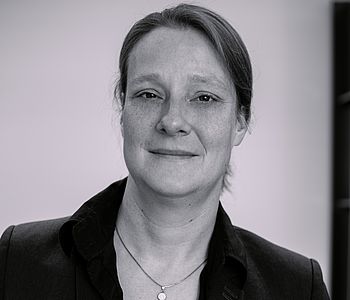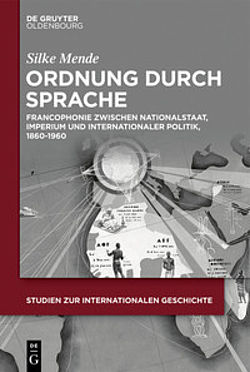Prof. Dr. Silke Mende | Associated Researcher
Former Member
Home Institution
:
WWU Münster, Historisches Seminar, Lehrstuhl Neuere und Neueste Geschichte (19. bis 21. Jh.)
|
Disciplines
:
History
|
Biography
Silke Mende is a contemporary historian. From October 2019 to March 2021, she was deputy director at Centre Marc Bloch (CMB) in Berlin. From November 2020 to March 2021 she was also Professor for the History of Europe (19th-21st century) at Humboldt University of Berlin. Since April 2021 she is professor for modern and contemporary history (19th-21st century) at the University of Münster. She continues to be an associated resarcher at the Centre Marc Bloch.
After having studied history and political science in Tübingen and Aix-en-Provence, Mende was initially a research assistant and subsequently an Akademische Rätin auf Zeit at the University of Tübingen. Research and teaching led her to the German Historical Institute Paris (GHIP), the Aix-Marseille Université, and the Centre d'Histoire de Sciences Po in Paris, to which she is still affiliated as an associate researcher. More recently, she has worked at the Leibniz Institute for Contemporary History Munich-Berlin (IfZ) and acted as interim professor (Professurvertretung) of 19th and 20th century transnational history at the European University of Flensburg.
Mende focuses on German, French and European history from the 19th century to the present day. In 2009, she received her doctorate at the University of Tübingen with a thesis on the emergence of the green movement in the German Federal Republic. The study, for which she was recipient of the Dr. Leopold Lucas-Nachwuchswissenschaftler-Preis, has been instrumental in advancing historiographical debates surrounding the transformational character of the 1970s, all while incorporating the long-termed continuity lines of the 20th century. In May 2018, Mende qualified at the University of Tübingen with a habilitation thesis on the history of Francophonie across the 19th and 20th centuries. Her research considers language and language policy as a political-cultural instrument and situates it amidst the complex interplay between the French nation-state, its empire, and the “international” arena. Her current research project deals with the European history of democracy and parliamentarism in the last third of the 20th century. It analyses how closely democratization, parliamentarization, and Europeanization intertwine in the context of the southward and eastward enlargement of the EEC/EU. Additional research interests include the history of representation, social movements and protest, as well as New Imperial History.
“A Democratic Europe”? Perspectives and Contours of Contemporary European History since 1970
France, Allemagne, Afrique. Représentations, transferts, relations / Frankreich, Deutschland, Afrika. Repräsentationen, Transfers, Beziehungen
September 04, 2024Emmanuel Droit , Romain Tiquet , Mouhamadou Moustapha Sow , Silke Mende , Anne Kwaschik (Hrsg.)
Schriftenreihe des deutsch-französischen Historikerkomitees, Band 22
Edition: Franz Steiner Verlag
Collection: Schriftenreihe des deutsch-französischen Historikerkomitees, Band 22
ISBN: 9783515137027
Seit der Aufklärung wurde die Geschichte Afrikas meist mithilfe von Kategorien und Begriffen aus dem Zettelkatalog der europäischen ‚Kolonialbibliothek‘ erzählt. Sie fungierte auf vielfältige Weise als Europas Projektionsfläche eines außereuropäischen „Anderen", der diskriminiert oder unterdrückt wurde. Die Autorinnen und Autoren nehmen die europäisch-afrikanische Beziehungsgeschichte neu in den Blick, indem sie nach deutsch-französisch-afrikanischen Transfers und Verflechtungen fragen.
Die Beiträge beleuchten die Beziehungen von europäischen und afrikanischen Akteurinnen und Akteuren auf lokaler, nationaler und internationaler Ebene zwischen Dakar, dem Kilimandscharo, Berlin und Straßburg. Die deutsch-französische Perspektive konturiert darüber hinaus aktuelle Fragen der Geschichtspolitik (u.a. Fragen der Erinnerungskultur und Restitutionsdebatten) neu und verdeutlicht Unterschiede und Gemeinsamkeiten in den Entwicklungen und Auseinandersetzungen. Der Band bietet eine breite, interdisziplinär inspirierte Diskussion, die strukturelle Bedingungen ebenso berücksichtigt wie Praktiken und Repräsentationen.
Ordnung durch Sprache. Francophonie zwischen Nationalstaat, Imperium und internationaler Politik, 1860–1960
July 06, 2020Silke Mende
Collection: Studien zur Internationalen Geschichte, 47
ISBN: 978-3-11-065236-9
Mit dem Begriff „Francophonie“ wird meist die Sprachpolitik Frankreichs ab den 1960er Jahren assoziiert. Ihre eigentliche Prägekraft als politisches Projekt entfaltete sie jedoch vom letzten Drittel des 19. Jahrhunderts bis zur Dekolonisierung. Sprache und Sprachpolitik waren zum einen ein sensibler Seismograph französischen Selbstverständnisses. Zum anderen wurden sie zu einem politisch-kulturellen Ordnungsinstrument, das auf die Etablierung und Verbreitung von Normen und Vorstellungen sowie die Herstellung gesellschaftlicher Integration und politischer Kohäsion zielte. Von Beginn an war es in gleichem Maße nach innen wie nach außen gerichtet.
Das Buch untersucht die Genese und Weiterentwicklung der Francophonie, nimmt ihre zentralen Akteure, Ideen und Praktiken in den Blick und untersucht ihre konkrete Ausgestaltung. Im Zentrum steht das komplexe Wechselspiel zwischen dem französischem Nationalstaat, seinem Imperium und der internationalen Politik. Damit werden diese häufig getrennt voneinander behandelten Dimensionen französischer Geschichte konsequent aufeinander bezogen. Zugleich wird der anglophone Schwerpunkt der Imperial- und Globalgeschichte um einen zentralen Aspekt des „French Imperial Nation-State“ ergänzt.
Ordnung durch Sprache
Francophonie zwischen Nationalstaat, Imperium und internationaler Politik, 1860–1960
Reihe: Studien zur Internationalen Geschichte, 47
De Gruyter Oldenbourg | 2020
DOI: https://doi.org/10.1515/9783110656305
Silke Mende ist Neuzeithistorikerin mit einem Schwerpunkt in der gegenwartsnahen Zeitgeschichte. Seit dem 1. Oktober 2019 ist sie stellvertretende Direktorin am Centre Marc Bloch.

